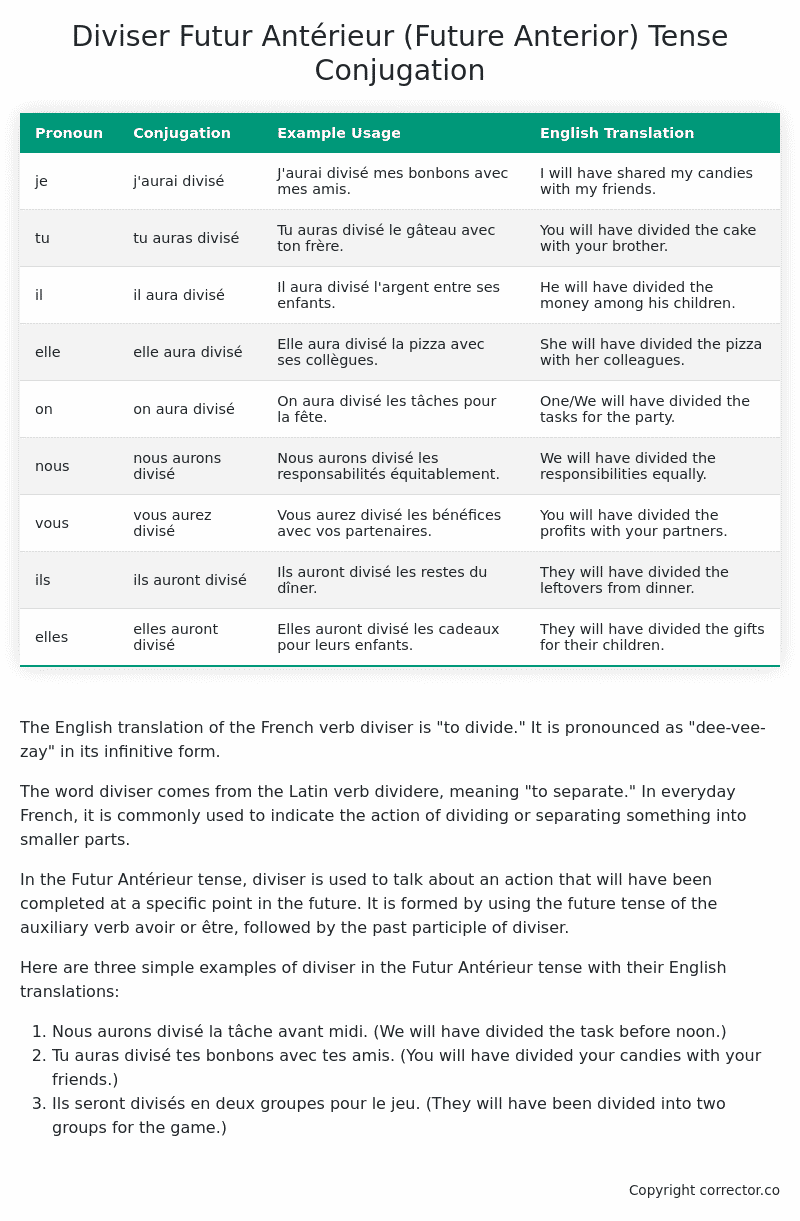Futur Antérieur (Future Anterior) Tense Conjugation of the French Verb diviser
Introduction to the verb diviser
The English translation of the French verb diviser is “to divide.” It is pronounced as “dee-vee-zay” in its infinitive form.
The word diviser comes from the Latin verb dividere, meaning “to separate.” In everyday French, it is commonly used to indicate the action of dividing or separating something into smaller parts.
In the Futur Antérieur tense, diviser is used to talk about an action that will have been completed at a specific point in the future. It is formed by using the future tense of the auxiliary verb avoir or être, followed by the past participle of diviser.
Here are three simple examples of diviser in the Futur Antérieur tense with their English translations:
- Nous aurons divisé la tâche avant midi. (We will have divided the task before noon.)
- Tu auras divisé tes bonbons avec tes amis. (You will have divided your candies with your friends.)
- Ils seront divisés en deux groupes pour le jeu. (They will have been divided into two groups for the game.)
Table of the Futur Antérieur (Future Anterior) Tense Conjugation of diviser
| Pronoun | Conjugation | Example Usage | English Translation |
|---|---|---|---|
| je | j’aurai divisé | J’aurai divisé mes bonbons avec mes amis. | I will have shared my candies with my friends. |
| tu | tu auras divisé | Tu auras divisé le gâteau avec ton frère. | You will have divided the cake with your brother. |
| il | il aura divisé | Il aura divisé l’argent entre ses enfants. | He will have divided the money among his children. |
| elle | elle aura divisé | Elle aura divisé la pizza avec ses collègues. | She will have divided the pizza with her colleagues. |
| on | on aura divisé | On aura divisé les tâches pour la fête. | One/We will have divided the tasks for the party. |
| nous | nous aurons divisé | Nous aurons divisé les responsabilités équitablement. | We will have divided the responsibilities equally. |
| vous | vous aurez divisé | Vous aurez divisé les bénéfices avec vos partenaires. | You will have divided the profits with your partners. |
| ils | ils auront divisé | Ils auront divisé les restes du dîner. | They will have divided the leftovers from dinner. |
| elles | elles auront divisé | Elles auront divisé les cadeaux pour leurs enfants. | They will have divided the gifts for their children. |
Other Conjugations for Diviser.
Le Present (Present Tense) Conjugation of the French Verb diviser
Imparfait (Imperfect) Tense Conjugation of the French Verb diviser
Passé Simple (Simple Past) Tense Conjugation of the French Verb diviser
Passé Composé (Present Perfect) Tense Conjugation of the French Verb diviser
Futur Simple (Simple Future) Tense Conjugation of the French Verb diviser
Futur Proche (Near Future) Tense Conjugation of the French Verb diviser
Plus-que-parfait (Pluperfect) Tense Conjugation of the French Verb diviser
Passé Antérieur (Past Anterior) Tense Conjugation of the French Verb diviser
Futur Antérieur (Future Anterior) Tense Conjugation of the French Verb diviser (this article)
Subjonctif Présent (Subjunctive Present) Tense Conjugation of the French Verb diviser
Subjonctif Passé (Subjunctive Past) Tense Conjugation of the French Verb diviser
Subjonctif Imparfait (Subjunctive Imperfect) Tense Conjugation of the French Verb diviser
Subjonctif Plus-que-parfait (Subjunctive Pluperfect) Tense Conjugation of the French Verb diviser
Conditionnel Présent (Conditional Present) Tense Conjugation of the French Verb diviser
Conditionnel Passé (Conditional Past) Tense Conjugation of the French Verb diviser
L’impératif Présent (Imperative Present) Tense Conjugation of the French Verb diviser
L’infinitif Présent (Infinitive Present) Tense Conjugation of the French Verb diviser
Struggling with French verbs or the language in general? Why not use our free French Grammar Checker – no registration required!
Get a FREE Download Study Sheet of this Conjugation 🔥
Simply right click the image below, click “save image” and get your free reference for the diviser Futur Antérieur tense conjugation!

Diviser – About the French Futur Antérieur (Future Anterior) Tense
Construction
Common Everyday Usage Patterns
Interactions with Other Tenses
For example
Summary
I hope you enjoyed this article on the verb diviser. Still in a learning mood? Check out another TOTALLY random French verb conjugation!


